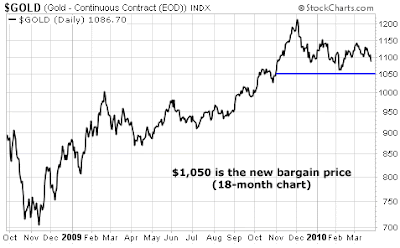Last weekend, my friend Porter Stansberry gave one of the most powerful speeches of his career (we've been working together for about 14 years, so I've seen a lot of them).
We were at the open-air Blue Iguana restaurant on Ambergris Caye in Belize. And Porter told the small crowd the story of the NEW Greatest Trade Ever...
After that speech, the attendees who weren't compelled to act on his idea are either incredibly foolish ("that's too crazy") or incredibly lazy ("ah, we've got time before all that comes to pass").
You might know the story of the old "Greatest Trade Ever." In short, in 2007, hedge-fund manager John Paulson made $15 BILLION for investors in his fund by betting against the housing market. (If you don't know the story, pick up the book The Greatest Trade Ever by Gregory Zuckerman.)
Betting against housing seems obvious in hindsight... But when Paulson put the trade on, he was essentially alone – everyone thought the government would somehow manage to keep the charade going.
Porter's speech in Belize was as compelling as Paulson's ideas were two years ago. Like Paulson's, Porter's trade is obvious, but everyone expects the government will smooth it over. Like Paulson's, Porter's trade may reach a point where the government simply can't fix it – and get there sooner than anyone expects.
Porter's idea is really big... He believes the entire paper money system is about to fail – very soon.
"If aliens landed tomorrow, they wouldn't understand our money system at all," he explained. "The aliens would ask, 'People really save these pieces of paper backed by nothing, issued without restraint, by a government that certainly can't pay its debts? That makes no sense!'"
As Porter sees it, "The United States is the only government in the world that can actually afford to underwrite the world's banking system. That's not because we have any real savings, it's only because we control the world's reserve currency. It's a paper standard, which means we can always print more of it."
Of course, that has been the case for years now. It's worked in the past. But Porter laid out the coming collapse of that system... and what's bringing it to a head right now:
"The annual funding costs of our national debt are now approaching $4 trillion per year between deficits and rolling over short-term debts. There is no entity large enough... not even China... that can come close to lending us the $4 trillion we need in the next 12 months. Add every possible source up, and you're still short by $2 trillion."
It was a dire speech. The most compelling part was the obvious inevitability of it all. The only question is the timing – when does the U.S. dollar house of cards fall?
Betting on the collapse of the paper money system will be the Greatest Trade Ever... some day. Porter predicts it will be way sooner than anyone thinks.
What does Porter recommend to play the new Greatest Trade Ever? One thing: Gold.
No point getting craftier than that. Governments can print money, but they can't print gold. Porter prefers to own it... Have it in your possession, not in a paper form in an account somewhere.
While the "end of paper money" is an outlandish prediction, Porter has a history of "outlandish" predictions that have come true...
Years ago, he predicted the end of General Motors. Many readers got angry and thought it was impossible. GM was an American icon. But Porter got it right, and GM shareholders were wiped out.
In November 2007, his single best idea at our annual investor conference was the demise of Fannie Mae and Freddie Mac. Back then, they were two of the largest companies in America. It was a shocking prediction. Within a year, they were bust.
Today, Porter's big prediction is his most outlandish ever. We're not talking about iconic American companies. We're talking the end of the world money system. But Porter's track record is excellent. And the outcome is inevitable, as he showed.
Porter is buying gold. And so is the guy who made the Greatest Trade Ever, John Paulson. Paulson recently took a multi-BILLION dollar position in gold and launched a gold fund.
In 2007, Paulson saw an inevitable crash in housing and made the Greatest Trade Ever.
In 2010, Paulson and Stansberry are betting against the dollar – they're buying gold. How about you?
























